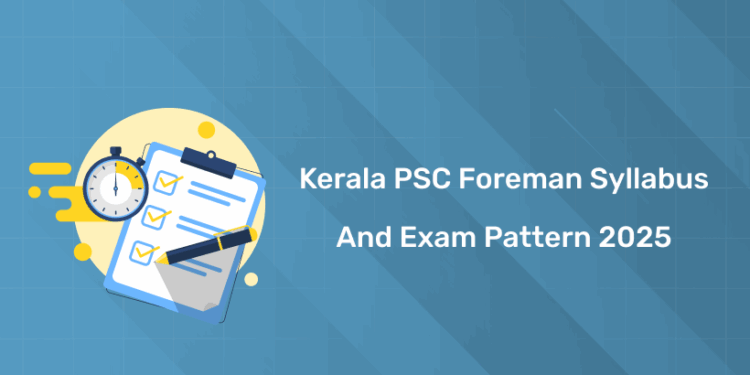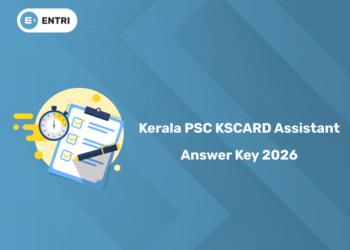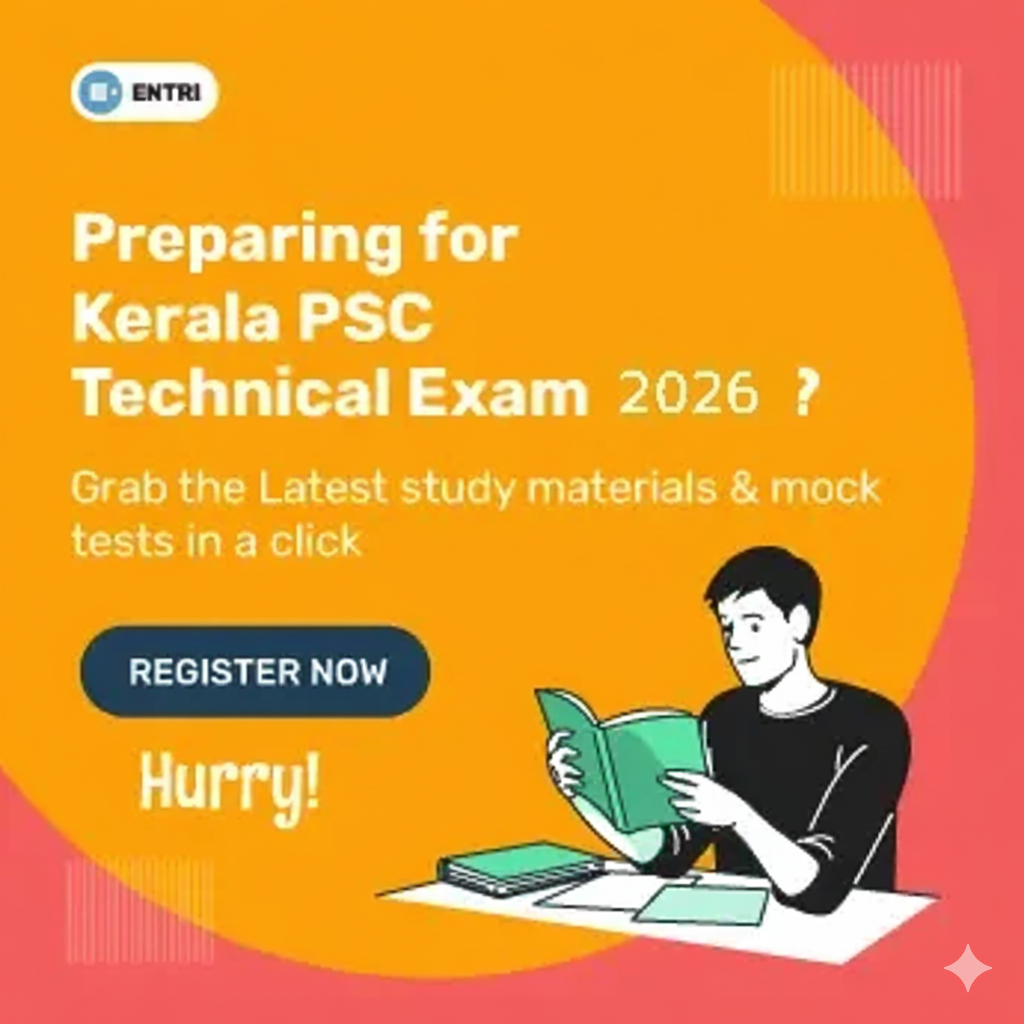Table of Contents
Kerala PSC has announced the Foreman recruitment 2025, and the exam will be held on January 13, 2025. Aspirants are advised to start their preparation without delay. The latest Foreman syllabus is available for download. Candidates can begin their preparation with the updated syllabus provided in this article. Note that questions may also be asked from topics related to the required educational qualification. Download the Kerala PSC Foreman Syllabus 2025 now!
Ace KPSC Technical Exams! JOIN NOW!
Kerala PSC Foreman Notification 2025 Highlights
| Particulars | Details |
| Name of recruiting organization | Kerala Public Service Commission (PSC) |
| Name of department | Kerala State Water Transport |
| Name of post | Foreman |
| Category Number | 98/2025 |
| Number of vacancies | As per Notification |
| Notification Release Date | June 17, 2025 |
| Exam Date | January 13, 2025 |
| Admit Card | December 29, 2025 |
| Mode of recruitment | Direct Recruitment |
| Mode of application | Online |
| Official website | keralapsc.gov.in |
Kerala PSC Foreman Syllabus 2025 PDF
1: Between the period of 1858-1947, how many Viceroys ruled over India?
You can download the Kerala PSC Foreman Syllabus & Exam Pattern 2025 PDF from the link below. Make sure to go through it thoroughly for effective planning.
Prepare for Kerala PSC Technical Exams with Entri
സർക്കാർ ജോലി എന്ന സ്വപ്നം ഇനി സ്വപ്നം മാത്രമല്ല! Join Kerala's Top-rated PSC Coaching Programs
Join NowKerala PSC Foreman Exam Pattern 2025
The Kerala PSC Foreman Exam 2025 will follow a structured pattern with questions divided across key technical topics. Each section carries equal weight, ensuring comprehensive assessment of a candidate’s knowledge in core engineering subjects. Below is the detailed breakdown of the exam pattern:
| Unit | Topics / Main Titles | Marks |
|---|---|---|
| UNIT I | Fluid Mechanics and Hydraulic Machines – Properties of Fluid, Fluid Pressure, Types of Fluids, Orifice/Notches/Venturimeter, Fluid Flow, Head Losses, Hydraulic Oils, Pumps, Turbines | 10 |
| UNIT II | Thermal Engineering – Laws of Thermodynamics, Thermodynamic Processes, Air Cycles (Carnot, Otto, Diesel, Joule, Dual), Petrol & Diesel Engines, I.C. Engine Performance & Testing, Compressors, Heat Transfer | 10 |
| UNIT III | Strength of Materials – Stresses & Strains, Stress-Strain Diagram, Hooke’s Law, Composite Sections, Thermal Stress, Friction, Beams (Shear Force & Bending Moment), Rivets & Bolts, Springs, Welded Joints | 10 |
| UNIT IV | Machine Elements, Materials and Boilers – Bearings, Governors, Flywheels, Gears, Boilers, Steam Engine, Materials (Cast Iron, Steel, Alloy, Non-Ferrous Metals) | 10 |
| UNIT V | Constructional Features of Engine and Related Systems – IC Engine Components, Fuel System, Lubrication and Cooling System | 10 |
| UNIT VI | Chassis – Frame, Front Axle, Suspension System, Steering System, Brake System | 10 |
| UNIT VII | Transmission and Electrical System – Clutches, Gearboxes, Drives, Wheels & Tyres, Electrical System, Ignition Systems | 10 |
| UNIT VIII | Transportation Management & Modern Technologies in Automobiles – M.V. Act Features, Road Geometry, Fuel Injection Systems, Pollution Control, Vehicle Accessories, Hybrid & Electric Vehicles | 10 |
| UNIT IX | Topic Based on Driving Licence – Motor Vehicles (Driving) Regulations 2017, Chapter II of Motor Vehicles Act 1988 (Licensing of Drivers) | 10 |
| UNIT X | Job Related Topics – Motor Vehicles Act 1988 (Preliminary, Registration, Control, Construction, Traffic Control, Insurance, Offences & Penalties), Kerala Motor Vehicles Taxation Act 1976 | 10 |
Kerala PSC Foreman 2025 Previous Question Papers
| Question Paper Category | |
| 075/2022 | |
| 122/2017 | |
| 109/2017 | |
| 148/2016 | |
| 236/2015 | |
| 154/2015 | |
| 134/2015 |
Kerala PSC Foreman Syllabus 2025 Detailed
UNIT I
FLUID MECHANICS AND HYDRAULIC MACHINES (10 Marks)
Properties of Fluid – Density, Specific Weight, Specific Volume, Specific Gravity, Viscosity, Kinematic Viscosity, Newton’s Law of Viscosity, Compressibility, Surface Tension, Capillarity. Fluid Pressure and Its Measurement – Pressure and Pressure Head, Absolute Pressure, Gauge Pressure, Atmospheric Pressure, Vacuum Pressure, Pressure Measuring Instruments and Their Principles – Piezometer Tube, Pressure Gauge, Manometer, ‘U’ Tube Manometer, Differential Manometer. Pascal’s Law – Types of Fluids – Ideal, Real, Newtonian and Non-Newtonian.
Orifice, Notches, and Venturimeter – Types of Fluid Flow – Steady Flow, Unsteady Flow, Uniform Flow, Non-Uniform Flow, Laminar Flow, Turbulent Flow. Continuity Equation, Head Losses, Major Losses, Minor Losses, Loss of Head Due to Friction – Darcy’s and Chezy’s Formula.
Properties of Hydraulic Oils such as Viscosity Index, Oxidation Stability, Demulsibility, Lubricity, Rust Prevention, Pour Point, Flash and Fire Point, Neutralization Number.
Hydraulic Machines – Different Types of Pumps: Centrifugal Pump, Reciprocating Pump – Slip, Efficiency, Discharge, Specific Speed. Turbines – Reaction and Impulse Turbines – Working Principle and Comparison.
UNIT II
THERMAL ENGINEERING (10 Marks)
Laws of Thermodynamics – Zeroth Law, First Law, Second Law. Thermodynamic Process – Isothermal Process, Isentropic Process – Work Done Equations and PV Diagrams. Air Cycles – Assumptions, Carnot Cycle, Otto Cycle, Diesel Cycle, Joule Cycle, Dual Combustion Cycle.
Petrol & Diesel Engines (Both 2-Stroke & 4-Stroke) – Working, P-V Diagrams, Valve Timing Diagrams.
I.C. Engines – Performance, Testing – Indicated Power, Brake Power, Frictional Power, Mechanical Efficiency, Indicated Thermal Efficiency, Brake Thermal Efficiency, Relative Efficiency, Total Fuel Consumption, Specific Fuel Consumption, Morse Test for Determination of I.P. of Multi-Cylinder Engine, Heat Balance Sheet.
Compressors – Working of Compressors, Use of Compressors, Different Types of Compressors – Single Stage Compressor, Multi-Stage Compressor, Single Action and Double Action Compressors, Work Done and Efficiency.
Heat Transfer – Conduction, Convection, and Radiation – Fourier’s Law of Thermal Conduction – Thermal Conductivity.
UNIT III
STRENGTH OF MATERIALS (10 Marks)
Types of Stresses and Strains – Tensile and Compressive, Longitudinal Stress and Lateral Strain, Poisson’s Ratio, Stress-Strain Diagram, Behaviour of Mild Steel & Brittle Material Under Tension – Limit of Proportionality, Elastic Limit, Yield Point, Ultimate Stress, Working Stress, Factor of Safety, Hooke’s Law, Principle of Superposition, Stresses in Varying Section, Stresses in Composite Section, Shear Stress and Shear Strain, Volumetric Strain, Young’s Modulus, Bulk Modulus, and Modulus of Rigidity – Relations. Thermal Stress and Strain – Nature and Magnitude of Stresses Due to Change in Temperature – Temperature Stress on Composite Bar.
Friction – Types of Friction, Laws of Friction, Centre of Gravity, Moment of Inertia, Shear Force and Bending Moment, Types of Beams and Loading Conditions, Shear Force and Bending Moment Diagrams and Equations in Different Types of Beams and Loads – Point Load, Uniformly Distributed Load, Cantilever Beam, Simply Supported Beam.
Rivets and Bolts – Types of Rivets, Types of Riveted Joints – Lap Joint, Single Riveted, Double Riveted, Butt Joint, Failure of Riveted Joints, Failure of Plates, Strength of Rivet, Strength of Plate, Strength of Riveted Joint, Efficiency of a Riveted Joint. Types of Bolts. Types of Springs – Spring Index, Deflection and Stiffness of Springs.
Welded Joints – Types of Fillet and Butt Welds, Welding Terms, Strength of Welded Joints.
UNIT IV
MACHINE ELEMENTS, MATERIALS AND BOILERS (10 Marks)
Bearings – Functions, Types of Bearings – Radial Bearings, Thrust Bearings, Sliding Contact Bearings, Rolling Contact Bearings, Journal Bearing – Bearing Characteristic Number, Heat Generated.
Functions of Governor – Types of Governors – Terms – Height, Equilibrium Speed, Mean Equilibrium Speed, Maximum & Minimum Equilibrium Speed, Sleeve Fit, Sensitiveness, Stability and Hunting of Governors.
Flywheels – Functions, Comparison with Governors – Fluctuation of Speed, Fluctuation of Energy, Coefficient of Fluctuation of Speed, Coefficient of Fluctuation of Energy, Energy Stored in Flywheels.
Gears – Types of Gears, Spur Gear Nomenclature, Gear Drive, Velocity Ratio, Types of Gear Train.
Boilers – Types, Boiler Accessories, Boiler Mountings. Steam Engine – Parts, Working.
Materials – Cast Iron – Types, Application. Steel – Types of Steel, Composition and Classification, Heat Treatment – Purpose and Methods, Alloy Steels – Types and Applications. Non-Ferrous Metals and Alloys – Applications.
MODULE V
CONSTRUCTIONAL FEATURES OF ENGINE AND RELATED SYSTEMS (10 Marks)
Constructional Details of IC Engines – Cylinder Block – Single Cylinder and Multi-Cylinder, Materials, Cylinder Liners. Cylinder Head – Materials, Cylinder Head Gasket. Pistons – Types of Pistons, Piston Rings – Materials, Types of Rings – Compression Ring, Oil Ring. Connecting Rod – Function, Materials Used, Big End and Small End Bearings. Crankshaft – Different Shapes. Types of Valves – Sodium Vapour Cooled Valves. Valve Operating Mechanisms – Side Camshaft and Overhead Camshaft. Inlet and Exhaust Valve Materials. Camshaft – Functions and Drives.
Fuel System – Different Fuel Feed Systems – A.C. Mechanical Pump, S.U. Electrical Pump, Petrol Filters and Air Cleaners. Carburetors – Simple Carburetors – Parts, Principle of Working – Compensation, Mixture Strength Requirement – Modern Carburetors, Float System, Idle and Slow Speed System, High-Speed System, Acceleration Pump and Choke System. Inlet Manifolds – Types, Variable Intake System, VVT (Variable Valve Timing), Continuously Variable Valve Timing (CVVT). Exhaust Manifolds – Construction, Catalytic Converter – Working, Muffler – Types.
Various Components in Diesel Fuel System – Distributor Type Pump, Rotary Type Pumps, Fuel Feed Pump and Hand Priming, Diesel Fuel Filters. Fuel Injector – Types. Turbocharger – Types, Working, Turbo Lag.
Lubrication and Cooling System – Types of Engine Lubrication – Wet and Dry Sump Lubrication, Splash and Pressure Feed Systems. Oil Pumps, Pressure Relief Valve, Oil Pressure Indicator, Oil Coolers, Oil Filters, Oil Seals, Crankcase Ventilation. Air and Water Cooling – Thermosyphon and Pump Circulation System, Thermostat, Radiator – Types, Pressure Cap, Types of Coolant, Pump, Antifreeze Solution, Cooling Fan – Types.
MODULE VI
CHASSIS (10 Marks)
Chassis and Frame – Chassis Constructional Details, Types of Frame, Frame Sections, Bumpers, Subframes, Materials Used. Front Axle – Types – Dead & Live Axle, Construction, Material, Cross Section. Stub Axle – Different Arrangements.
Suspension System – Types of Front Suspension for Two, Three & Four Wheeler. Rear Suspension System. Introduction to Springs and Shock Absorbing Devices – Types, Leaf, Coil Springs & Their Arrangements, Helper Spring, Spring Shackle, Shackle Pin, Telescopic Type Shock Absorber.
Steering System – Principles of Steering, Ackermann, Davis Fifth Wheel. Steering Gearbox – Types, Worm & Roller, Worm & Sector, Recirculating Ball, Rack & Pinion. Steering Linkages – Arrangement, Components. Power Steering – Integral, Linkage Type, Collapsible Type Steering Column. Factors Affecting Wheel Alignment.
Brake System – Types of Brakes – Mechanical, Hydraulic, Pneumatic, Servo Brake, Air Brake. Drum and Disc Brake System, Internal Expanding and Externally Contracting. Master Cylinder – Types, Working Principle. Wheel Cylinder, Brake Bleeding. Air Brake – Working. Servo Brake – Types, Working Principle. Disc Brake – Working.
MODULE VII
TRANSMISSION SYSTEM AND ELECTRICAL SYSTEM (10 Marks)
Transmission System – Principle of Friction Clutches – Constructional Features and Working of – Single Plate Dry Clutch, Diaphragm Clutch, Cone Clutch, Centrifugal Clutch, Semi-Centrifugal Clutch, Vacuum Clutch, Hydraulic Clutch, Electromagnetic Clutch, Multi-Plate Clutch (Dry & Wet), Fluid Flywheel, Clutch Disc, Pressure Plate.
Constructional Features & Working of – Sliding Mesh Gearbox, Constant Mesh Gearbox, Synchromesh Gearbox, Progressive Type Gearbox, Epicyclic Gearbox, Torque Converter, Gear Selector and Shifting Mechanism. 2-Wheeler Transmissions – Gear Drive, Chain Drive, CVT & Automatic Transmission.
Propeller Shaft and Universal Joint, Torque Tube Drive, Hotchkiss Drive, Constant Velocity Joints, Front Wheel Drive, Differential Mechanism, Rear Axles – Types.
Wheels – Spoked Wheel, Disc Wheel, Alloy Cast Wheel, Composite Wheel. Tyre Construction (Cross-Sectional Details), Tubeless Tyre, Tyre Tread Patterns, Inflation Pressure and Its Effects, Factors Affecting Tyre Performance.
Electrical System – Constructional Details of Automobile Dynamo, Constructional Details of Alternator, Charging System – Necessity, Types of Regulators. Starter Switch, Starter Motor – Constructional Features, Starter Motor Drives – Necessity, Types of Starter Motor Drives, Mechanisms – Bendix Drive (Inboard & Outboard), Overrunning Clutch, Axial Starter (Sliding Armature), Pre-Engaged Type.
Types of Ignition System – Coil Ignition, Components – Ignition Coil, Contact Breaker Points, Cam Angle, Condenser, Distributor, Spark Plug – Types, Spark Advance & Retard Mechanism (Centrifugal & Vacuum), Magneto Ignition System – Low Tension & High Tension, Rotating Armature & Rotating Magnet Type. Electronic Ignition Systems – Transistorized Ignition, Computer-Controlled Ignition, Distributor-Less Ignition System.
UNIT VIII
TRANSPORTATION MANAGEMENT & MODERN TECHNOLOGIES IN AUTOMOBILES (10 Marks)
Transportation Management – Features of M.V. Act, Definition of Terms, Test for Drivers and Conductors, Registration of Vehicles, Duties of Drivers and Conductors, Traffic Signs, M.T.O and Functional Wings, Organization Chart. Road Geometry – Width of Highway, Gradient, Cross Section of Road, Superelevation and Sight Distance, Road Intersection. Insurance Surveying – Companies, Classification of Policies, Factors Involved in Assessing.
Fuel Injection Systems – Fuel Injection Systems in Petrol and Diesel Engines, E.F.I – Types, MPFI, Gasoline Direct Injection System, Throttle Body Injection, Sensors – Types and Construction, Actuators, Common Rail Diesel Fuel System, ECM, Electronic Fuel Injectors.
Automobile Pollution – Sources of Pollution, Methods to Control Petrol Engine and Diesel Engine Emissions, Reduction of Compression Ratio, Blow-By Control System, PCV System, Afterburner, Catalytic Converter, Control of Oxides of Nitrogen, EGR, Evaporative Emission Control System – Charcoal Canister, Diesel Smoke and Its Control, Emission Norms.
Vehicle Accessories – Cruise Control, Electric Seat and Mirror, Intelligent Windscreen Wiper, Automatic Climatic Control, Adaptive Noise Control System, Parking Distance Control, Restraint Systems – Seat Belt, Airbag, Electronic Stability Control, ABS, Keyless Entry & Vehicle Immobilizer, Automatic Traction Control System, GPS.
Hybrid and Electric Vehicles – Social and Environmental Importance, Benefits & Challenges, Policies Related to Electric and Hybrid Vehicles. Features of Electric Vehicle – Electric Vehicle Drive Components. Hybrid Electric Vehicle – Components.
II. TOPIC BASED ON DRIVING LICENSE (10 Marks)
A. Motor Vehicles (Driving) Regulations, 2017 (05 Marks)
B. Chapter II of The Motor Vehicles Act, 1988 (Licensing of Drivers of Motor Vehicles) (05 Marks)
III. JOB RELATED TOPICS (10 Marks)
A. THE MOTOR VEHICLES ACT, 1988 (07 Marks)
CHAPTER I: PRELIMINARY
Section 2(1) – Adapted Vehicle
Section 2(1A) – Aggregator
Section 2(2) – Articulated Vehicle
Section 2(15) – Gross Vehicle Weight
Section 2(16) – Heavy Goods Vehicle
Section 2(17) – Heavy Passenger Motor Vehicle
Section 2(21) – Light Motor Vehicle
Section 2(22) – Maxi Cab
Section 2(23) – Medium Goods Vehicle
Section 2(24) – Medium Passenger Motor Vehicle
Section 2(25) – Motor Cab
Section 2(26) – Motor Car
Section 2(29) – Omnibus
Section 2(33) – Private Service Vehicle
Section 2(35) – Public Service Vehicle
Section 2(47) – Transport Vehicle
Section 2(48) – Unladen Weight
CHAPTER IV: REGISTRATION OF MOTOR VEHICLES
Section 39 – Necessity for Registration
Section 44 – Production of Vehicle at the Time of Registration
Section 46 – Effectiveness in India of Registration
Section 52 – Alteration in Motor Vehicle
Section 53 – Suspension of Registration
Section 55 – Cancellation of Registration
Section 56 – Certificate of Fitness of Transport Vehicles
CHAPTER V: CONTROL OF TRANSPORT VEHICLES
Section 66 – Necessity of Permits
CHAPTER VI: SPECIAL PROVISIONS RELATING TO STATE TRANSPORT UNDERTAKINGS
Section 99 – Preparation and Publication of Proposal Regarding Road Transport Service of a State Transport Undertaking
CHAPTER VII: CONSTRUCTION, EQUIPMENT AND MAINTENANCE OF MOTOR VEHICLES
Section 109 – General Provision Regarding Construction and Maintenance of Vehicles
Section 110A – Recall of Motor Vehicles
Section 110B – Type-Approval Certificate and Testing Agencies
CHAPTER VIII: CONTROL OF TRAFFIC
Section 112 – Limits of Speed
Section 113 – Limits of Weight and Limitations on Use
Section 114 – Power to Have Vehicle Weighed
Section 120 – Vehicles with Left-Hand Control
Section 122 – Leaving Vehicle in Dangerous Position
Section 123 – Riding on Running Board, Etc.
Section 125 – Obstruction of Driver
Section 126 – Stationary Vehicles
Section 127 – Removal of Motor Vehicles Abandoned or Left Unattended on a Public Place
Section 128 – Safety Measures for Drivers and Pillion Riders
Section 129 – Wearing of Protective Headgear
Section 131 – Duty of the Driver to Take Certain Precautions at Unguarded Railway Level Crossing
Section 132 – Duty of Driver to Stop in Certain Cases
Section 133 – Duty of Owner of Motor Vehicle to Give Information
Section 134 – Duty of Driver in Case of Accident and Injury to a Person
Section 134A – Protection of Good Samaritans
Section 136 – Inspection of Vehicles Involved in Accident
Section 136A – Electronic Monitoring and Enforcement of Road Safety
CHAPTER XI: INSURANCE OF MOTOR VEHICLES AGAINST THIRD-PARTY RISKS
Section 146 – Necessity for Insurance Against Third-Party Risk
CHAPTER XIII: OFFENCES, PENALTIES AND PROCEDURE
Section 177 – General Provision for Punishment of Offences
Section 177A – Penalty for Contravention of Regulations Under Section 118
Section 178 – Penalty for Travelling Without Pass or Ticket and for Dereliction of Duty on the Part of Conductor, and Refusal to Ply Contract Carriage, Etc.
Section 179 – Disobedience of Orders, Obstruction, and Refusal of Information
Section 180 – Allowing Unauthorized Persons to Drive Vehicles
Section 181 – Driving Vehicles in Contravention of Section 3 or Section 4
Section 182 – Offences Relating to Licences
Section 182A – Punishment for Offences Relating to Construction, Maintenance, Sale and Alteration of Motor Vehicles and Components
Section 182B – Punishment for Contravention of Section 62A
Section 183 – Driving at Excessive Speed, Etc.
Section 184 – Driving Dangerously
Section 185 – Driving by a Drunken Person or by a Person Under the Influence of Drugs
Section 186 – Driving When Mentally or Physically Unfit to Drive
Section 187 – Punishment for Offences Relating to Accident
Section 188 – Punishment for Abetment of Certain Offences
Section 189 – Racing and Trials of Speed
Section 190 – Using Vehicle in Unsafe Condition
Section 192 – Using Vehicle Without Registration
Section 192A – Using Vehicle Without Permit
Section 193 – Punishment of Agents and Canvassers Without Proper Authority
Section 194 – Driving Vehicle Exceeding Permissible Weight
Section 194A – Carriage of Excess Passengers
Section 194B – Use of Safety Belts and the Seating of Children
Section 194C – Penalty for Violation of Safety Measures for Motorcycle Drivers and Pillion Riders
Section 194D – Penalty for Not Wearing Protective Headgear
Section 194E – Failure to Allow Free Passage to Emergency Vehicles
Section 194F – Use of Horns and Silence Zones
Section 196 – Driving Uninsured Vehicle
Section 197 – Taking Vehicle Without Authority
Section 198 – Unauthorized Interference with Vehicle
Section 198A – Failure to Comply with Standards for Road Design, Construction, and Maintenance
Section 199A – Offences by Juveniles
Section 200 – Composition of Certain Offences
Section 202 – Power to Arrest Without Warrant
Section 206 – Power of Police Officer to Impound Document
Section 207 – Power to Detain Vehicles Used Without Certificate of Registration Permit, Etc.
Section 208 – Summary Disposal of Cases
CHAPTER XIV
Section 213 – Appointment of Motor Vehicles Officers
B. THE KERALA MOTOR VEHICLES TAXATION ACT, 1976 (03 Marks)
Section 2(e) – Purchase Value
Section 3 – Levy of Tax
Section 3A – Levy of Green Tax
Section 4 – Payment of Tax and Issue of Licence
Section 5 – Exemption from Tax
Section 6 – Refund of Tax
Section 7 – Payment of Additional Tax
Section 10 – Power of Officers of Police or Motor Vehicles Department to Stop Motor Vehicles
Section 11 – Power to Seize, Detain, and Sell Motor Vehicles
Section 12 – Additional Tax Payable When Tax is Not Paid
Section 13 – Amounts Recoverable as Arrears of Land Revenue
Section 26 – Escaped Assessment
Prepare for Kerala PSC Technical Exams with Entri
സർക്കാർ ജോലി എന്ന സ്വപ്നം ഇനി സ്വപ്നം മാത്രമല്ല! Join Kerala's Top-rated PSC Coaching Programs
Join NowHow to Download Kerala PSC Foreman Syllabus & Exam Pattern 2025
To download the official Kerala PSC Foreman syllabus, please follow these steps:
- Visit the Official Kerala PSC Website: Go to the Kerala Public Service Commission’s official site: keralapsc.gov.in.
- Navigate to the ‘Syllabus’ Section: On the homepage, hover over or click on the ‘Syllabus’ tab in the main menu.
- Select ‘Post-wise Syllabus’: From the dropdown menu, choose ‘Post-wise Syllabus’.
- Search for ‘Foreman’: Use the search function and type ‘Foreman’ to quickly locate the syllabus for the Foreman post.
- Download the Syllabus: Once you find the Foreman syllabus, click on the link provided to open the PDF document. You can then download or print it for your reference.
Please note that the Foreman syllabus may be listed under specific categories such as ‘Foreman (Electrical)’ or ‘Foreman (Mechanical)’, depending on the specialization. Good luck!











